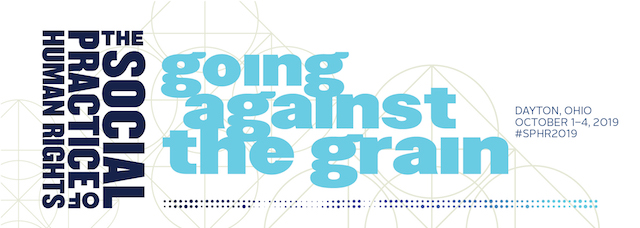Location
Impact and Measurement Tools
Start Date
10-4-2019 10:30 AM
End Date
10-4-2019 12:00 PM
Keywords
Raising Awareness, Campaigns, Activism, Grassroots, Education
Abstract
In the last decade, the practice of awareness-raising for human rights has appeared as notably common across the board. Nevertheless, widespread awareness-raising has not necessarily always resulted in meaningful and sustainable impact. Accepting that awareness raising is not a panacea, we challenge the global collective fascination with big impact, while considering the power of small strategic impact that invests in education, and building alliances, and has the potential to last and to expand by way of gradual encroachment through contextually-defined grassroots means natural to its course.
Empowered through social media, advocates are increasingly enthusiastic about reaching massive audiences by way of campaigns which if effectively designed and executed, travel far and wide. Acknowledging the potential power of awareness-raising, this practice should not be mistaken as an end in and of itself. In fact, if viewed as an end, such campaigns can arguably bear detrimental unintended consequences: While giving an impression of activism they may fail to channel the collective energy of the public into strategic and sustainable action focused on appropriately-scoped and scalable change.
In this context, we explore the original aim(s) of awareness-raising as a concept, as well as its limitations and capacities. Moreover, we will revisit the parameters of structural, foundational and sustainable impact. In doing so, we will examine successful strategies for translating awareness-raising into behavioral change and measurable impact in other contexts (e.g., environmental movement, or public health).
Finally, we will challenge the notion of global as it stands today, rejecting the notion that the west always seem to have lessons learned on human rights to offer to the Global South. As western societies struggle with backlash and hostility towards progress, there are valuable opportunities to learn from experiences of the Global South on grassroots activism, and the importance of patience in seeking impact.
Author/Speaker Biographical Statement(s)
Azadeh Pourzand is an independent human rights researcher and the Executive Director of Siamak Pourzand Foundation, dedicated to the promotion of freedom of expression. She has contributed to the design, implementation and impact evaluation of civil society strengthening, media development, education and human rights programs for marginalized communities in the Middle East and South Asia in organizations such as IREX, Small Media Foundation, Open Society Foundation and Impact Iran. Her research and writing focus on human rights in Iran, with an emphasis on freedom of expression, rule of law, ethnic rights, and women's economic empowerment. An alumna of Kennedy School of Government (HKS), Oberlin College and Nyenrode Business Universiteit, she served as the editor-in-chief of HKS's Women's Policy Journal and a teaching fellow at the Department of Near Eastern Languages and Civilizations (NELC) at Harvard University. Azadeh is also currently a selected member of BMW Foundation Responsible Leaders Network and the Oslo Women's Rights Initiative. Earlier in 2019, she served as a featured speaker and panelist at the Nobel Peace Center in Norway (Oslo). She is currently in the early stages of a research project on women's struggles for equality in contemporary Iran.
Ali Arab is an Associate Professor of Statistics at Georgetown University. His research is focused on statistical modeling for problems in environmental studies, ecology, and epidemiology where sensitivities to changes in the climate are of interest. He is actively involved in promoting science and human rights including promoting the role of human rights in science education, and organizing student activities related to science and human rights. He serves as on the American Association for the Advancement of Science (AAAS)-Science and Human Rights Coalition Council. He is also a member of the Board of Directors of Amnesty International USA.
Included in
Reclaiming Impact in the Age of Awareness-raising for Human Rights
Impact and Measurement Tools
In the last decade, the practice of awareness-raising for human rights has appeared as notably common across the board. Nevertheless, widespread awareness-raising has not necessarily always resulted in meaningful and sustainable impact. Accepting that awareness raising is not a panacea, we challenge the global collective fascination with big impact, while considering the power of small strategic impact that invests in education, and building alliances, and has the potential to last and to expand by way of gradual encroachment through contextually-defined grassroots means natural to its course.
Empowered through social media, advocates are increasingly enthusiastic about reaching massive audiences by way of campaigns which if effectively designed and executed, travel far and wide. Acknowledging the potential power of awareness-raising, this practice should not be mistaken as an end in and of itself. In fact, if viewed as an end, such campaigns can arguably bear detrimental unintended consequences: While giving an impression of activism they may fail to channel the collective energy of the public into strategic and sustainable action focused on appropriately-scoped and scalable change.
In this context, we explore the original aim(s) of awareness-raising as a concept, as well as its limitations and capacities. Moreover, we will revisit the parameters of structural, foundational and sustainable impact. In doing so, we will examine successful strategies for translating awareness-raising into behavioral change and measurable impact in other contexts (e.g., environmental movement, or public health).
Finally, we will challenge the notion of global as it stands today, rejecting the notion that the west always seem to have lessons learned on human rights to offer to the Global South. As western societies struggle with backlash and hostility towards progress, there are valuable opportunities to learn from experiences of the Global South on grassroots activism, and the importance of patience in seeking impact.



